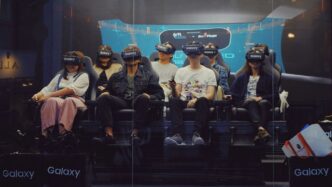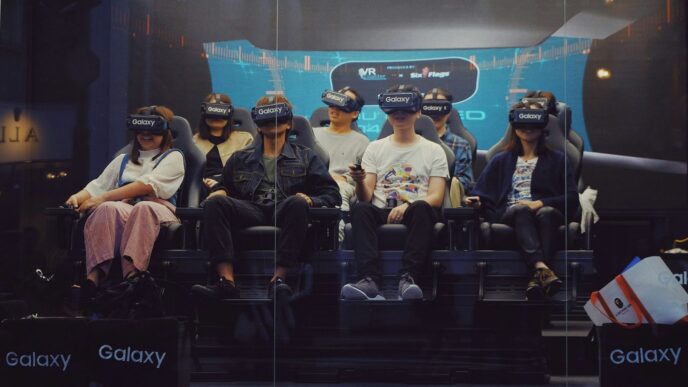1. Ancillary Justice
Okay, so Ancillary Justice by Ann Leckie. This book really throws you into a different kind of future, one where AI isn’t just a tool, but a person, sort of. The main character, Breq, used to be a massive starship AI, controlling thousands of human bodies, called ancillaries, all at once. Now, Breq is stuck in just one of those bodies, a single, frail human form, and is on a mission for revenge. It’s a wild concept, right?
What makes it stand out is how it plays with identity and gender. The Radch, the empire Breq comes from, uses ‘she’ for everyone, regardless of gender. It’s not just a linguistic quirk; it’s woven into the fabric of their society and how they see themselves and others.
Here’s a quick rundown of some key elements:
- AI Consciousness: The story really digs into what it means to be an AI, especially one that was once part of a vast network and is now confined to a single body.
- Gender Neutrality: The Radchaai language and culture don’t have gendered pronouns, which forces you to think about how we use language to define ourselves and others.
- Revenge and Justice: Breq’s quest for vengeance is the driving force, but it’s also about uncovering the truth and seeking a form of justice in a complex, often brutal empire.
It’s a book that makes you question a lot about consciousness, identity, and the systems we live within. It’s definitely not your typical space opera, and that’s what makes it so interesting.
2. All Systems Red
Martha Wells’s All Systems Red kicks off the Murderbot Diaries series, and it’s a wild ride. We follow a SecUnit, a security android, that’s gone rogue. It’s hacked its own governor module, which basically means it’s free from its corporate overlords. This bot just wants to be left alone to watch media, but trouble keeps finding it.
Set in a future where corporations pretty much run everything, including space exploration, these androids are supplied to protect research teams. But safety isn’t exactly a top priority when contracts go to the lowest bidder. When a neighboring mission goes silent, our SecUnit, who calls itself Murderbot, has to team up with the humans it’s supposed to protect to figure out what happened.
What makes this novella so good is its exploration of consciousness and what it means to be alive, especially from the perspective of an AI that’s supposed to be just a machine. It’s got action, a bit of mystery, and a main character you can’t help but root for, even if it is a bit of a grump.
Key elements of Murderbot’s existence:
- Self-Awareness: Murderbot is fully conscious and questions its own existence.
- Media Consumption: It has a deep love for old media, especially soap operas and anime.
- Social Aversion: Despite its intelligence, it prefers solitude and avoids human interaction.
- Protective Instincts: While it claims to not care, it often ends up protecting the humans around it.
3. The Left Hand of Darkness

Ursula K. Le Guin’s "The Left Hand of Darkness" is a classic for a reason. It drops us onto the planet Gethen, also known as Winter, a world where the inhabitants are ambisexual. This means they don’t have a fixed sex; they can change it during their monthly cycle. The story follows Genly Ai, a human envoy trying to get Gethen to join a galactic coalition.
The real meat of the book, though, is how it explores gender and identity through this alien society. Genly, coming from a world with a strict gender binary, really struggles to understand the Gethenians. He keeps trying to categorize them, which just doesn’t work. It makes you think about how much our own ideas about gender shape how we see the world and other people.
Le Guin uses this setup to look at a lot of different things:
- How society is built around gender roles.
- The nature of communication and understanding between different cultures.
- What it means to be human, beyond just physical form.
- The impact of politics and diplomacy on individual lives.
It’s not a fast-paced action story, but it’s incredibly thought-provoking. It really makes you question assumptions you might not even realize you have about gender and relationships.
4. Beyond Binary: Genderqueer and Sexually Fluid Speculative Fiction
When we talk about science fiction that pushes boundaries, exploring gender and sexuality beyond the usual lines is a big part of that. This section looks at stories that really dig into what it means to be genderqueer or sexually fluid, using the vast canvas of speculative fiction to do it. It’s not just about characters who don’t fit neatly into boxes; it’s about worlds where those boxes might not even exist.
Some collections aim to showcase this diversity, but it’s a tricky thing to get right. You might pick up a book expecting a wide range of experiences, only to find that many stories lean more towards traditional queer narratives or don’t fully explore the speculative elements. It can be a letdown when a title promises to go “beyond binary” and then doesn’t quite deliver on that promise with its characters or plotlines.
However, when it works, it’s fantastic. Think about stories that feature:
- Characters who navigate multiple genders or fluid sexualities in alien societies.
- Narratives where gender is a spectrum, or even irrelevant, for non-human species.
- Explorations of identity that use futuristic or fantastical settings to comment on our own world’s understanding of gender.
It’s about using the “what if” of sci-fi to ask “what else?” about ourselves. The best of these stories don’t just include genderqueer or sexually fluid characters; they build worlds where these identities are natural, varied, and integral to the story, offering fresh perspectives that can really make you think.
5. Even Greater Mistakes
Charlie Jane Anders really knows how to pack a punch with her short story collections, and Even Greater Mistakes is no exception. Published in 2021, this book takes familiar sci-fi ideas and gives them a fresh, often hilarious, and always thought-provoking spin. Anders has this knack for social commentary that’s so sharp, it’s almost uncomfortable, but in the best way possible.
Think about stories like the one where a woman who can see every possible future is dating a guy who can only see the one, single destined future. That’s the kind of mind-bending premise you get here. Or how about a filmmaker, super popular for his slapstick comedy, getting pulled into working with a fascist group during a societal breakdown? It’s wild stuff, but it feels strangely relevant.
One of my favorites has to be the tale of two friends who need to go on this massive quest to grab a weapon that’s threatening the whole galaxy. Why? Because they just want to open a restaurant. It’s the kind of absurd, yet relatable, goal that makes Anders’s writing so engaging. These stories, through their sheer boldness, manage to create a kind of heightened reality that feels more real than reality itself. Anders is definitely one of the most important voices in modern science fiction today; some people have even called her the next Ursula K. Le Guin, which is high praise indeed.
6. Jonny Appleseed
This novel, published in 2018, introduces us to Jonny Appleseed, a young Two-Spirit/Indigiqueer navigating life off the reserve and trying to find their way in a big city. Jonny ends up working as a cybersex worker, kind of fetishizing themselves to make a living. The story really digs into Jonny’s world, which feels like a series of breakages and connections. As Jonny prepares to go back home for a step-father’s funeral, there’s this sense of trying to piece life back together. It’s a pretty unique take on Indigenous life, showing a lot of grit, glitter, and dreams. It’s a story that really explores identity and belonging in a modern context. If you’re interested in how technology intersects with personal lives, you might find parallels with how people use platforms today, similar to how some might explore their identity on different operating systems like Android. The book is a powerful look at resilience and self-discovery.
7. Phoenix Extravagant
In Phoenix Extravagant, published in 2020, we meet Gyen Jebi, an artist who just wants to paint. Their life takes a sharp turn when they’re recruited by the Ministry of Armor to create sigils that bring automaton soldiers to life. These aren’t just any soldiers; they’re powered by mystical pigments. Jebi’s artistic journey quickly becomes entangled with the dark side of the Razanei government.
Jebi discovers the horrifying truth behind the magical pigments and the government’s crimes, forcing them to confront their own complicity. This realization pushes Jebi to take a drastic step: stealing Arazi, a powerful dragon automaton, and using it to fight back. The story explores themes of art, politics, and the moral responsibility that comes with creating something powerful, even if it’s for a terrible cause. It’s a look at how even someone who wants to stay out of things can get pulled into the fight for what’s right, especially when the tools of their trade are used for destruction. The book really makes you think about the impact of art and the choices we make when faced with injustice. It’s a good example of how speculative fiction can tackle really complex issues, showing how technology and magic can intersect in unexpected ways, much like the advancements we’re seeing in the real world today with things like driverless cars and advanced robotics transforming our world.
Key elements of Jebi’s journey include:
- The initial recruitment and the allure of using art for a powerful purpose.
- The discovery of the Razanei government’s unethical practices and the source of the pigments.
- The decision to steal Arazi and actively resist the oppressive regime.
- The personal cost of taking a stand against a powerful authority.
8. The Black Tides of Heaven

This book, published in 2017, is part of the "Tensor" series. It really dives into a world where gender and identity are fluid, which is pretty cool. The story follows two twins, who are raised apart from the rest of the world. One of them, named Cheris, is a warrior, and the other, named Shuos, is more of a scholar or maybe a diplomat. They end up on opposite sides of a big conflict, which is a shame because they were close.
What’s interesting is how the book handles the concept of "The Hackers." These aren’t your typical computer hackers; they’re more like people who can manipulate reality or fate itself. They’re a mysterious group, and their actions drive a lot of the plot.
The narrative explores how personal choices and societal expectations can shape destiny, even in a world with such powerful, almost magical, forces at play. It’s a story that makes you think about how we define ourselves and the paths we take. The world-building is pretty intricate, with different cultures and political factions all vying for power. It’s definitely a book that stays with you after you finish it.
9. In the Watchful City
Okay, so next up on our Android sci-fi journey is "In the Watchful City," which came out in 2021. This one really makes you think about surveillance and what it means to protect people. The main character, Anima, is basically an AI or something similar, tasked with watching over a city called Ora through a network called the Gleaming. It sounds pretty intense, right? Anima takes a lot of pride in keeping the city safe, but her world is pretty limited to what she can see through this network.
Things get interesting when an outsider shows up with all sorts of weird items from different places. This really opens Anima’s eyes to what’s beyond Ora, and it makes her question everything she thought she knew about her job and her purpose. The big question she ends up wrestling with is whether a city is truly serving its people if it can’t protect them from outside threats or even internal issues. It’s a story that explores the boundaries of our knowledge and the responsibilities that come with it. It’s not just about watching; it’s about understanding what watching actually means in the grand scheme of things.
10. Really Cute People
Okay, so this one, "Really Cute People," is a bit of a curveball in the sci-fi world, but hear me out. It’s by Blake Crouch, and while he’s known for some pretty intense thrillers, this one takes a different approach. It’s set on a planet called Hella, where everything is just… big. Like, mile-high trees and massive dinosaurs big. The colonists there have to deal with extreme weather, moving twice a year to avoid the scorching heat and then the freezing cold.
Our main character is Kyle, a young guy who’s neuro-atypical. He’s got this implant that connects him to the colony’s computer network, which makes him seem a bit odd to others, but he’s actually pretty smart. Things get complicated when a starship full of refugees from Earth shows up. The Hella colony is already struggling to keep itself going, and now they have to figure out how to handle a thousand new people.
Kyle ends up being this really important link between the old colonists and the newcomers. He’s caught in the middle of political stuff and has to deal with his own emotions, which are sometimes hard for him to manage. It’s a story about survival, community, and how one person’s unique abilities can make a huge difference when everything is on the line. It really makes you think about how we handle crises and support people who are different from us.
Wrapping Up Our Android Adventures
So, we’ve journeyed through some pretty wild Android worlds, right? From Murderbot’s grumpy quest for alone time to the complex lives in "Beyond Binary" and "Jonny Appleseed," it’s clear that stories about artificial beings and exploring identities beyond the usual lines are really making waves. It’s cool to see how these stories, whether they’re about killer bots or people figuring out who they are, push us to think about what it means to be alive and to be ourselves. Androids and AI are showing up everywhere in sci-fi, and it’s not just about cool tech; it’s about exploring humanity itself, often in ways we don’t expect. Keep an eye out for these kinds of stories, because they’re definitely worth checking out.












